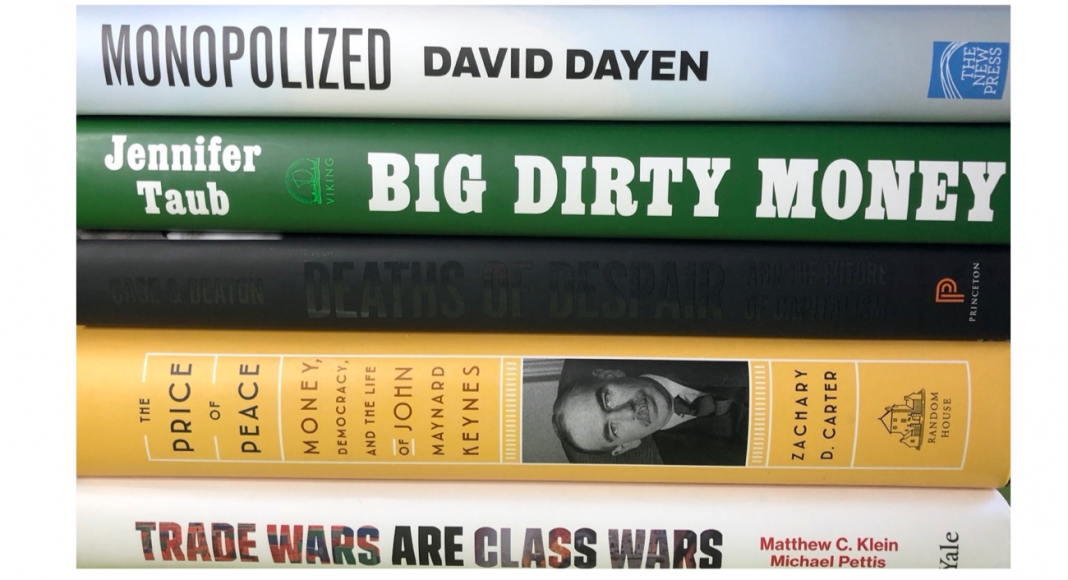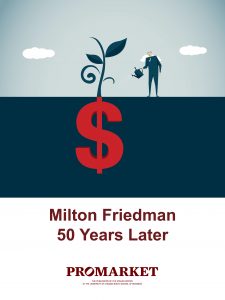A travelogue of monopoly, the dangers of elite impunity, and the relevance of John Maynard Keynes: here are (in no particular order) some of the best books published during the past year.
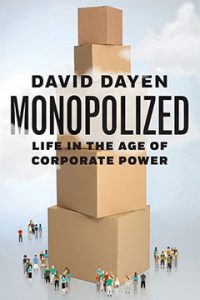
Monopolized: Life in the Age of Corporate Power by David Dayen
In a year rife with books about monopolies, David Dayen’s Monopolized stands out for its riveting exploration of how the concentration of economic power has come to pervade and transform every corner of American life. In addition to its remarkable command of the academic literature, the unique contribution of Monopolized lies in its storytelling, integrating copious amounts of research with the personal accounts of ordinary Americans toiling under the yoke of unaccountable private monopolists, among them miserable airline passengers, small farmers squeezed by agribusiness giants, a cancer patient who can’t get treatment because of a shortage in IV solution, and Amazon sellers who embarked on a relationship only to find out they first had to ask for Jeff Bezos’s blessing. This seamless weaving of data and narrative makes Monopolized—“a travelogue of monopoly,” as Dayen calls it—such an extraordinary achievement. [Read our interview with Dayen here, as well as Hal Singer’s review of the book.]
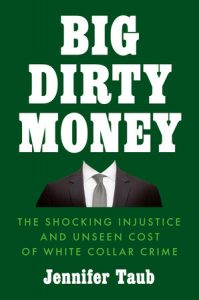
Big Dirty Money: The Shocking Injustice and Unseen Cost of White Collar Crime by Jennifer Taub
White collar crime in the US, writes Jennifer Taub in Big Dirty Money, costs victims an estimated $300-800 billion per year. Street-level property crimes, on the other hand, cost around $16 billion per year. Why, then, are low-level burglars so much more likely than white-collar offenders to end up behind bars? The reason lies in America’s two-tiered criminal justice system, in which, if you’re rich and powerful (or a corporation), you are essentially free to break the law with impunity (or simply change the laws to suit your interests). Taub, a law professor at Western New England University, is not the first to hone in on America’s failure to prosecute corporate criminals—Jesse Eisinger’s The Chickenshit Club and Matt Taibbi’s The Divide come to mind—yet Big Dirty Money is a powerful polemic about the dangers of elite impunity. “Elite crime pays. It pays very well,” she warns. The result? An “elite crime spree” that dangerously erodes trust in democracy.
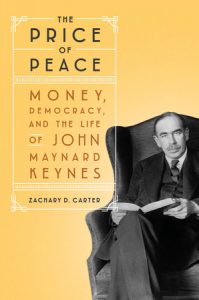
The Price of Peace: Money, Democracy, and the Life of John Maynard Keynes by Zachary D. Carter
Carter’s superb book is as much a biography of Keynes as it is an intellectual biography of Keynesianism. While not shying away from the more piquant details of his subject’s life, Carter’s narrative revolves around the development of Keynes’s ideas, even going beyond Keynes’s death in 1946 to cover the high-point of Keynesianism during the post-war period and the fierce neoliberal backlash that caused much of his thinking to be sidelined or—as was often the case—perverted by politicians from both left and right. Though Keynes is undoubtedly one of the most influential economic thinkers of the past century, Carter writes, much of what we refer to today as Keynesianism bears little connection to his moral and political ideals. Keynes, in his telling, was first and foremost a social and moral philosopher, his work deeply rooted in a moral vision of economics as a tool to achieve a more equal society. As the US and the world face the combined threats of Covid-19, extreme inequality, and an impending climate crisis, Keynes remains as relevant as ever, and The Price of Peace offers an incredibly engrossing read.

Liberty from All Masters: The New American Autocracy vs. the Will of the People by Barry C. Lynn
Barry Lynn’s previous book, Cornered (2010), was the foundational text of today’s burgeoning antimonopoly movement and as such should be considered one of the most influential economic texts of the past decade. Lynn’s new book, the culmination of a three-part investigation into the effects of corporate concentration that began with End of the Line: The Rise and Coming Fall of the Global Corporation (2005), is much broader in scope than its two predecessors. In it, Lynn (founder and executive director of the Open Markets Institute) frames the suspicion of concentrated power—that of the state and of private corporations—as a recurring theme throughout American history, at least until the neoliberal “overthrow of America’s system of antimonopoly law” that took place in the 1980s. Taking inspiration from both Louis Brandeis and W.E.B. Du Bois, Liberty from All Masters attempts to disentangle monopoly from American capitalism and to propose a unified theory of American liberty. It is an ambitious project, and the end result is fascinating. [Read our recent interview with Lynn here, as well as an excerpt from the book.]
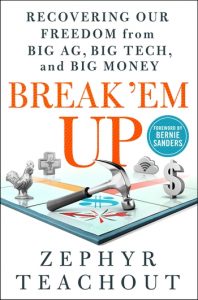
Break ‘Em Up: Recovering Our Freedom from Big Ag, Big Tech, and Big Money by Zephyr Teachout
Earlier this month, the FTC and over 40 state attorneys general filed antitrust charges against Facebook, seeking to break it up. Days later, dozens of state attorneys general launched two new antitrust cases against Google. These suits, as well as the landmark DOJ antitrust suit against Google that preceded them, are the most significant US antitrust cases since Microsoft. Along with the House Judiciary Report on digital platforms, which also called for structural separations, and the EU’s new Digital Markets Act that alludes to the possibility of similar remedies, they also mark a huge shift in antitrust thinking. How did it come about? No one, perhaps, has made a more forceful case for such remedies than Fordham law professor Zephyr Teachout. Break ‘Em Up provides a comprehensive account of how monopolies not only hurt the economy but also act as political entities, subverting public institutions and the rule of law. Reinvigorating antimonopoly laws and reasserting Congressional supremacy over the Supreme Court in antitrust policy, argues Teachout, are key to saving American democracy from the threat of authoritarianism. Anyone who wishes to understand the current antimonopoly moment we’re in would do well to read this book. [Read our recent interview with Teachout here, as well as her recent testimony before the House Judiciary antitrust subcommittee.]
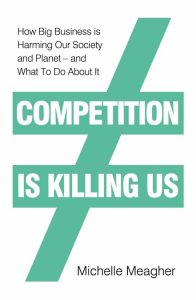
Competition is Killing Us: How Big Business is Harming Our Society and Planet by Michelle Meagher
In 2013, the Rana Plaza garment factory complex in Dhaka, Bangladesh, collapsed, killing 1,134 people. The disaster highlighted the unsafe working conditions in these makeshift factories and harmed the reputation of Western fashion brands that used them. To Meagher, then a competition lawyer working on a merger between two soda companies, this was a moment of personal reckoning: the workers toiling in Bangladesh and the merging companies, she came to realize, were at opposite ends of a ruthless global system that feeds on cheap labor and treats human lives as disposable. This system of shareholder capitalism ostensibly relies on competition, but inevitably leads to concentration and unaccountable power. Competition, she argues, “has come to be synonymous with market domination. Companies compete for power, for the benefit of their shareholders, in ways that harm society.” Pervasive myths about free-market competition “keep us in perpetual hope, ignorance and willful complacency,” writes Meagher, before outlining a vision of competition policy in which stakeholders play a more active role.
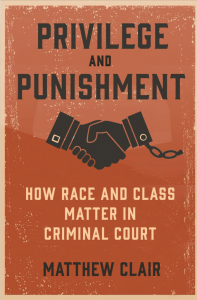
Privilege and Punishment: How Race and Class Matter in Criminal Court by Matthew Clair
Published close to the end of a year that saw a global reckoning with police brutality and racial inequities, Stanford sociologist Matthew Clair’s Privilege and Punishment is a revealing ethnographic study of the relationships between defendants and lawyers and how those embody the race and class divides embedded within the American criminal justice system. Relying on in-depth interviews and courtroom observations, Clair shows how disadvantaged defendants are “often ignored, silenced, or coerced” by prosecutors, judges, and even their own defense attorneys when they attempt to understand their legal rights or advocate for themselves. Privileged defendants, on the other hand, enjoy a “trusting relationship” with an effective lawyer, which often results in “leniency, ease of navigation, and even some rewards.”
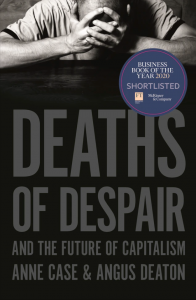
Deaths of Despair and the Future of Capitalism by Anne Case and Angus Deaton
Five years ago, Case and Deaton published their first groundbreaking study of rising mortality rates among white non-Hispanic Americans without a bachelor’s degree, which they attributed to a dramatic increase in deaths related to drug overdose, alcohol, and suicide—“deaths of despair.” Their latest book builds on their previous work, but places the epidemic that continues to wreak havoc on working-class Americans within a wider socioeconomic and political context, focusing on the roles of globalization, regulatory capture, money in politics, and the weakening of labor unions. All these trends combined, as they put it, mean that “the American economy has shifted away from serving ordinary people and toward serving businesses, their managers, and their owners.” Deaths of Despair is a harrowing, necessary book. [Read our recent interview with Deaton here, and watch our webinar with Deaton on deaths of despair and Covid-19.]
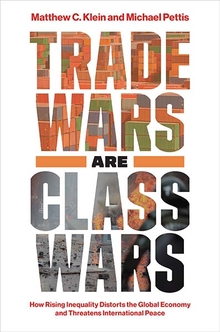
Trade Wars Are Class Wars: How Rising Inequality Distorts the Global Economy and Threatens International Peace by Matthew C. Klein and Michael Pettis
Klein’s and Pettis’s explosive book revolves around a provocative argument: “Trade war is often presented as a war between countries. It is not: it is a conflict mainly between bankers and owners of financial assets on one side and ordinary households on the other—between the very rich and everyone else.” The trade war between the US and China, for instance, is often viewed in nationalistic terms, as if the two superpowers have irreconcilable economic agendas. Not so, claim Klein and Pettis, who argue that the trade dispute between the US and China is the result of specific political choices meant to enrich China’s elites at the expense of Chinese workers—and American workers as well, thanks to the collusion of US business interests. The two authors issue a stark warning: if we continue to misunderstand the origins of trade disputes and global imbalances, we risk recreating the toxic cocktail of financial breakdown and virulent nationalism that led to catastrophe in the 1930s.
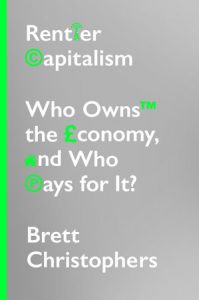
Rentier Capitalism: Who Owns the Economy, and Who Pays for It? by Brett Christophers
Three years ago, the United Nations Conference on Trade and Development (UNCTAD) published a report arguing that hyperglobalization and growing market concentration have led to the emergence of a “global rentier capitalism” in which endemic rent-seeking has become the new normal. In Rentier Capitalism, Brett Christophers makes a similar argument, examining various sectors in which profit derives from monopolistic control of scarce assets, rather than innovation. Christophers’s focus is the UK—in which, he argues, rentier capitalism has reshaped politics and the economy, creating the perfect conditions for Brexit—but his analysis of present-day rentierism could be applied to other countries as well.
More Great Books:
- Thomas Piketty’s Capital and Ideology is a massive tome that is even more expansive than its predecessor, a staggeringly ambitious work of political economy that examines the ideologies that have sustained inequality throughout human history. [Read our interview with Piketty here and Branko Milanovic’s review of the book.]
- Competition Overdose by Maurice E. Stucke and Ariel Ezrachi is an enthralling examination of how too much competition, in certain cases, can be toxic for society. [Read a recent piece by Ezrachi here]
- Stephanie Kelton’s The Deficit Myth is a compelling introduction to modern monetary theory. [Listen to our Capitalisn’t episode on the right and wrong of the modern monetary theory.]
- In Monopolies Suck, Sally Hubbard produced a concise, accessible guide to the pernicious effects of monopolization on the US economy. [Read Hubbard’s recent testimony before the House Judiciary antitrust subcommittee, as well as her analysis of the Google antitrust case.]
- Veblen by Charles Camic is an exhaustive intellectual biography of one of the most original (and prescient) economic thinkers of the early 20th century.
- Lucas Chancel’s Unsustainable Inequalities provides an essential examination of the interconnection between economic inequality and the environment.
- Also, don’t miss out on our new e-book: Milton Friedman 50 Years Later





